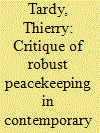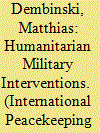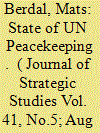| Srl | Item |
| 1 |
ID:
103217


|
|
|
|
|
| Publication |
2011.
|
| Summary/Abstract |
The concept of robust peacekeeping emerged in response to the failures of the UN in Rwanda and Bosnia and Herzegovina, where peacekeepers were passive witnesses of massive violations to human rights, allegedly because they were not 'robust enough'. Although robust peacekeeping is not a new concept and has been partially implemented in some operations (Sierra Leone, Democratic Republic of Congo, Haiti, Lebanon), it attracted renewed attention in 2008-10 with developments in its conceptualization. While it recognizes the necessity and virtue of a robust approach as a protection mechanism for peacekeepers, this article questions the extent to which robust peacekeeping is politically acceptable and operationally viable. Beyond the doctrinal difficulty of ensuring compatibility of robustness with the principles of peace operations, robust peacekeeping is directly challenged by the perennial constraints of contemporary peace operations, such as weak political support, the erratic availability and quality of troops, and the reticence of troop contributors to embrace a robust approach. Overall, while robustness is presented as a solution to the 'credibility gap' that the UN faces, its relevance in the light of these problems is dubious.
|
|
|
|
|
|
|
|
|
|
|
|
|
|
|
|
| 2 |
ID:
169244


|
|
|
|
|
| Summary/Abstract |
The article offers a much-needed impulse to the debate on humanitarian military interventions, which is characterized by conceptual confusion and a lack of comparative research. Based on a comprehensive review of the literature, we identify the most important definitional controversies and discuss the conceptual pros and cons of the respective positions. We illustrate how definitional choices affect comparative research using a new dataset covering all humanitarian military interventions since the Second World War. Classic definitions based on ideal types might have normative merits, but they cannot ground an empirical research programme because they vacate the universe of cases. However, military interventions for declared humanitarian purposes are here to stay, and they should be analysed instead of defined into oblivion. Thus, the definition should reflect the practice of humanitarian military interventions, not subordinate the humanitarian purpose to violations of sovereignty and international law. The definition must not be restricted to interventions reacting to death tolls that ‘shock the conscience of mankind’; it must also consider interventions in the early stages of conflict. Moreover, military interventions should not be disregarded when the humanitarian motive is not exclusive or predominant.
|
|
|
|
|
|
|
|
|
|
|
|
|
|
|
|
| 3 |
ID:
160029


|
|
|
|
|
| Summary/Abstract |
The article considers the state of UN peacekeeping through the prism of its long-running operation in the Democratic Republic of the Congo (DRC). Focusing in particular on the challenges raised by use of force and the protection of civilians in conditions of ongoing armed conflict, it argues that UN field operations must be aligned much more closely than they have been over the past 15 years to political and diplomatic efforts aimed at securing viable political settlements to internal conflict. The issues raised by the history of the UN’s troubled mission in the DRC are deeply relevant to the wider discussion of the organisation’s role in the field of peace and security.
|
|
|
|
|
|
|
|
|
|
|
|
|
|
|
|